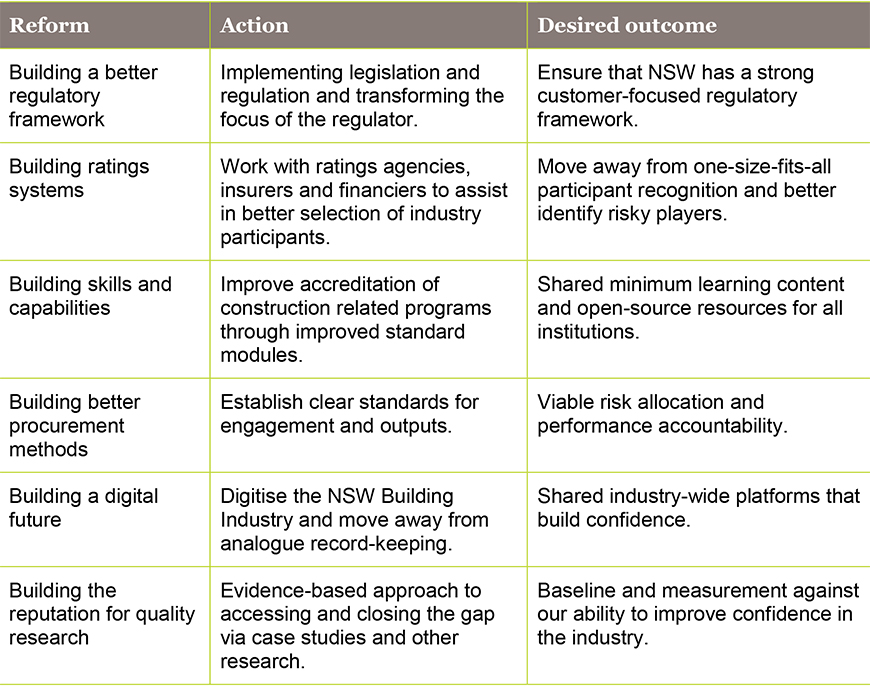
NSW building industry Six Reform Pillars: ratings systems and regulatory overhaul

Intended to improve transparency, accountability and quality of work within the NSW building industry, the Six Reform Pillars are the first publicly-released outline of the NSW Building Commissioner's work plan to overhaul the State's building and construction industry. However, before they can be formally introduced, the Six Reform Pillars require NSW Parliament to pass the Design and Building Practitioners Bill.
The Six Pillar Reforms are specifically targeted to prevent repeats of the Opal and Mascot towers cracking controversies but have been criticised by NSW Labor and Green for being "too soft".
Combined with the Design and Building Practitioners Bill (currently before the NSW Upper House), the Six Reform Pillars form part of the NSW Government's response to the Shergold-Weir Report released in April 2018. The Shergold-Weir Report considered the effectiveness of compliance and enforcement systems for the building and construction industry across Australia and provided 24 recommendations to improve the national best practice model for effectively implementing building regulation and the National Construction Code.
The Six Reform Pillars

Rating systems to trigger increase scrutiny by the NSW Building Commissioner
The core of the Six Reform Pillars features a new system under which builders, developers, engineers, designers and certifiers are rated and awarded an overall score based on a range of metrics, such as:
- their record on workplace safety;
- handling of customer complaints;
- financial credibility;
- the age of the business; and
- whether there are any suspicions of phoenixing (creating a new company to continue the business of another company that was deliberately liquidated to avoid paying debts).
Those with poor scores are flagged on a database to ensure their projects are heavily scrutinised by the NSW Building Commissioner. Any operator with a suspect rating runs the risk of the Building Commissioner blocking the building's occupation certificate if the project is deemed potentially dangerous. Without an occupation certificate, a building cannot be occupied and a developer could potentially be forced to refund buyer deposits. Since December 2019, buyers are not required to settle on a purchase until an occupation certificate is issued.
Other reforms
Among the other planned measures is a focus on improving skills within the industry by raising the accreditation of construction-related programs and an end to analogue record-keeping within three years, digitising and expanding access through industry-wide digitised platforms.
Builders would also be required to produce a digitised set of as-built drawings at the conclusion of every project before an occupation certificate may be issued. Building Commission staff will conduct audits and review the drawings, which will also be available to building strata committees.
Ensuring you can comply with the new building and construction laws
The NSW Government is aiming to revive public faith in the building and construction industry by significantly overhauling the regulatory framework and increasing enforcement powers to increase compliance across the industry. Builders, developers and certifiers unwilling to adapt to the proposed reforms risk being left behind.
Contact us if you would like assistance to prepare for how these proposed reforms may impact your business.
Get in touch
